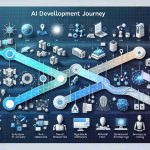Artificial intelligence is transforming the field of endoscopy, offering groundbreaking technologies that revolutionize medical procedures. According to leading expert Luigi Pasquale, Director of Gastroenterology and Digestive Endoscopy at Monaldi Hospital in Naples, AI plays a crucial role in enhancing diagnostic processes.
Pasquale emphasizes that advanced diagnostic procedures, such as colonoscopies, have significantly improved in recent years. Colonoscopies enable effective screening for potentially evolving lesions at an early stage by examining the internal lining of the colon and rectum for anomalies like polyps or tumors.
While the accuracy of these examinations traditionally relied on the experience of the operating physician, Pasquale highlights the entry of artificial intelligence into this realm. AI now supports doctors in diagnosing conditions by utilizing sophisticated deep learning algorithms to analyze endoscopic images in real-time, identifying lesions with a high degree of precision.
Moreover, AI tools not only detect lesions but also predict their histology, providing insights to the physician on whether the anomaly is potentially dangerous adenomas or harmless non-adenomatous lesions. By reducing the number of missed lesions, AI greatly enhances the quality of colonoscopies.
It is crucial to note that while AI is reshaping endoscopy practices, the expertise and judgment of the physician remain essential. Artificial intelligence acts as a valuable adjunct to medical professionals rather than a replacement, as only the doctor can make informed decisions regarding patient treatment.
Although AI integration in endoscopy is still in its nascent stages, significant advancements are expected in the near future. Undoubtedly, artificial intelligence is on track to become an indispensable tool in patient care, facilitating substantial changes in medical approaches.
Exploring New Horizons: Artificial Intelligence and its Unseen Impact on Endoscopy
Artificial intelligence continues to pave the way for innovation in the realm of endoscopy, offering a plethora of capabilities that are reshaping the landscape of medical examinations. While it has been highlighted how AI enhances diagnostic processes and aids in the identification of lesions during procedures like colonoscopies, there are several additional aspects worth considering.
What are the lesser-known applications of AI in endoscopy?
AI in endoscopy extends beyond just diagnosing lesions. It also enables real-time tracking of the endoscope’s position within the body, aiding in precise navigation during procedures. Furthermore, AI algorithms can help in assessing the cleanliness of the gastrointestinal tract, ensuring optimal visualization for accurate examinations.
What are the key challenges associated with AI implementation in endoscopy?
One of the primary challenges is ensuring data privacy and security, especially when handling sensitive patient information. Moreover, the need for standardized guidelines and regulatory frameworks to govern the development and use of AI technologies in endoscopy is a pressing issue that the medical community must address.
What are the advantages and disadvantages of AI in endoscopy?
Advantages of AI in endoscopy include increased accuracy in lesion detection, reduced chances of missed diagnoses, and improved procedural efficiency. On the other hand, potential disadvantages may involve overreliance on AI systems, which could lead to complacency among healthcare professionals and the risk of misinterpretation of AI-generated recommendations.
Exploring the Future of AI in Endoscopy
While the integration of AI in endoscopy is still evolving, the potential for transformative impact is immense. As AI technologies mature and adapt, their role in improving patient outcomes and revolutionizing medical practices will become increasingly prominent, driving the field of endoscopy towards greater precision and efficacy.
For further insights on the latest advancements in AI technologies in healthcare, visit HealthIT.gov. This official website by the U.S. Department of Health and Human Services provides valuable resources and updates on the intersection of technology and healthcare delivery, including the integration of artificial intelligence in medical practices.






















